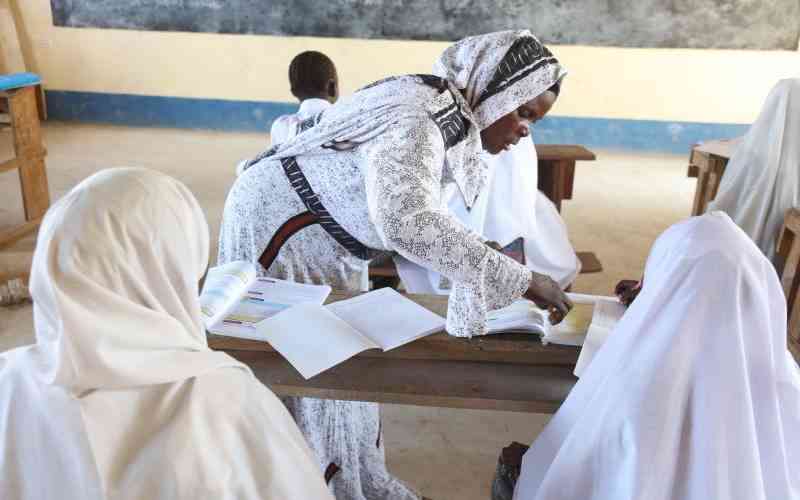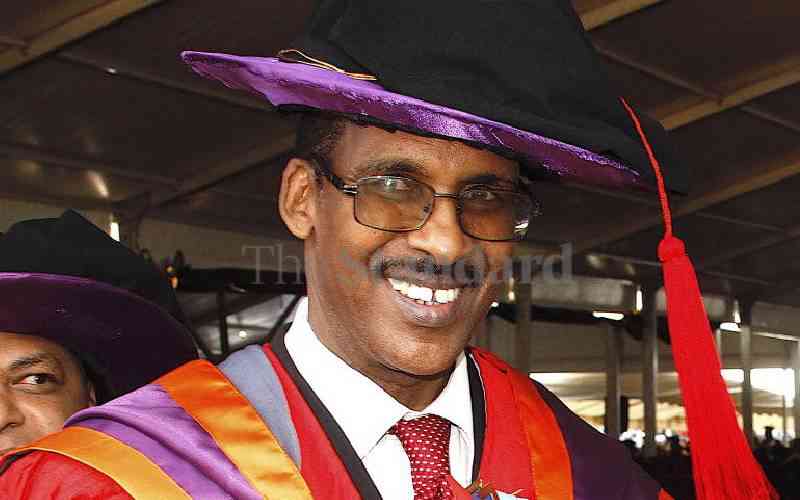“I do not remember the last time my family ate breakfast, lunch and supper in a day. I do not know if my family will ever have the luxury of having three meals a day as life is getting tougher each day,” says Patrick Maina, a father of five who has lived in Nairobi’s Mukuru kwa Njenga slum for 21 years.
Mr Maina, a cobbler in the slum, says he cannot even afford to take his children to school; not because of school fees, but because he cannot afford to buy them uniform.
The 54-year-old says his family slept hungry last night. This morning, only the little one, a four-year-old child, had a cup of porridge, which a neighbour shared with them.
He does not know if they will have lunch or dinner today.
This family’s difficult life is a depiction of what millions of Kenyans undergo every day. For them, the idea that the economy is growing is yet to manifest in daily life.
Becoming worse
For Beatrice Amondi, a grocery trader at Kipsongo slum in Trans Nzoia County, rent keeps increasing without a commensurate rise in earnings.
“Despite the Government saying the economy is growing, life is becoming worse by the day,” she says.
Ironically, Kenya’s economy has been relatively stable since 2010. Last year, the country’s gross domestic product (GDP) expanded by 4.7 per cent from 4.6 per cent the previous year.
According to the Economic Survey 2014, the performance was supported by a stable macroeconomic environment, low and stable inflation, infrastructural development and growth of the construction sector.
The manufacturing sector grew by 4.8 per cent from 3.2 per cent in 2012, while transport expanded by 3.3 per cent.
In the same period, the survey says the Central Bank Rate, a key signal of commercial banks’ lending rates, reduced from 11 per cent in December 2012 to 8.5 per cent during the first half of 2013.
Further, the number of people employed increased from 12.8 million in 2012 to 13.5 million in 2013. And in the capital markets, the total number of shares traded increased by 38.7 per cent.
But despite these growth figures, many Kenyans still feel the cost of living has increased while incomes have not followed a similar trajectory.
Critics claim the reason for this is that the Kenya National Bureau of Statistics (KNBS), a Government agency that collects, compiles, analyses and disseminates statistical information for public use, may be working with economic data that does not fully capture the economic situation, affecting national planning.
Stay informed. Subscribe to our newsletter
In response, KNBS Acting Director General Zachary Mwangi said economic data cannot be 100 per cent accurate. However, he said the bureau regularly updates statistics to ensure they reflect the realities of the economic landscape.
But there is still a section of economists and academicians who question inflation figures on the back of rising food prices, rent and transport costs over the past five years. Inflation generally means a reduction in the value of money, where, for instance, Sh100 buys fewer products this month than it did in the previous one.
Food prices
On September 1, KNBS in a statement said year-on-year inflation rose to 8.36 per cent in August from 7.67 per cent in July. But investigations reveal that since July, food prices have been falling as farmers in Western, Nyanza and South Rift regions record early beans, sorghum, millet and maize harvests.
In addition, an increased supply of maize from neighbouring countries has contributed to a further drop in prices, easing the cost of flour countrywide.
Indeed, in early August, a 90-kilogramme bag of dry maize went for Sh2,627 and a 90-kilogramme bag of wheat cost Sh3,225. By mid-August, these prices had dropped to Sh2,557 and Sh3,150.
The numbers controvert KNBS’ recent assertion that the sustained increase in the general price level of goods and services in the month of August was due to increased food prices.
But it is not only inflation numbers that are feared to be painting a raw picture of the country’s economy.
In a preliminary prospectus in June just before the flotation of the Eurobond, Treasury said a major portion of the Kenyan economy is not recorded due to the fact that a significant share of it is made up of the “shadow economy”.
Despite citing that around 82.5 per cent of jobs created in 2012 came from the informal sector as detailed by KNBS, the prospectus trashed the assertion. According to the document, the informal economy is not adequately captured.
It is also only partially taxed, resulting in a lack of revenue for the Government, ineffective regulation, unreliability of statistical information and inability to monitor or otherwise regulate a large portion of the economy.
The Government, however, has started several initiatives to formalise the sector, with the most recent attempt being the digitisation of public transport. It has also tried to ease tax compliance and is in the process of mapping rental properties.
Most affected
The prospectus further stated that the statistical information published by Kenya is unreliable as it differs from that produced by other sources.
The National Treasury, KNBS and Central Bank of Kenya all produce statistics relating to Kenya and its economy, but these are typically inconsistent, which is often attributed to variations in how the institutions compile data.
The figures most affected by these inconsistencies are those relating to GDP and the balance of payments (BOP).
GDP is the monetary value of all the finished goods and services produced within the country in a specific period. It includes all private and public consumption, Government outlays, investments and exports.
On the other hand, BOP summarises a country’s economic transactions with the world. It usually comprises two accounts: current and capital.
The former includes transactions in goods, services, investment income and current transfers, while the latter mainly includes transactions in financial instruments.
By not having accurate data on its BOP, academics and economists say it is impossible for Kenya to come up with life-changing national and international economic policy.
Specific objectives
Although Treasury Cabinet Secretary Henry Rotich said there have been significant efforts to improve the compilation of Kenya’s BOP data in recent years, including through technical assistance provided by the International Monetary Fund (IMF), errors and omissions persist.
“The inability to improve the compilation of key fiscal and economic indicators may affect how effectively Government policy is made in response to such statistical information, and thus have a material adverse effect on Kenya’s economic growth,” he said.
Economic policies are often targeted at specific objectives that, in turn, impact the BOP. For instance, a country may adopt policies specifically designed to attract foreign investment in a particular sector. Another nation may attempt to keep its currency at an artificially depressed level to stimulate exports and build up currency reserves.
In Kenya’s case, with accurate economic numbers, policies would be better formulated to create more employment opportunities and make life cheaper for Kenyans.
There are also critics who are concerned over what they termed the “overstatement” of some of the data, particularly as regards job creation.
According to the Economic Survey 2014, about 750,000 jobs were created last year.
“For an economy of Kenya’s scale, this number of jobs would have had significant ripple effects on the overall growth. This has so far not been felt. The numbers just do not add up,” said Dr Emmanuel Manyasa, an economics lecturer at Kenyatta University.
Data on Kenyans living below the poverty line is also feared to be higher than the 43.4 per cent (or 19.3 million people) reported last year.
This means that many more Kenyans with inadequate physical security and low access to health, education, clean water and sanitation may be overlooked in the Government’s poverty alleviation plans.
In a telephone interview, Mr Mwangi said those who doubt the accuracy of the country’s economic numbers are welcome to scrutinise them.
“Our data sources are reliable. We are neither under any pressure nor do we consult anyone before we release statistics,” he said.
“Our work is professionally done and audited by internal institutions, such as the World Bank.”
He cited the recent rebasing of the country’s GDP, which he said was peer-reviewed by the World Bank and IMF, among other global institutions.
Policy analysis
Christopher Balding of Peking University added that it becomes difficult to make informed policy decisions about an economy if a country lacks accurate data.
Prof Balding, who has written extensively about economic data manipulation in China, said in an exclusive interview that if politicians and policy makers do not have data that correctly represents the state of an economy, they may be susceptible to making poor decisions.
“If you have bad data and make a good-faith policy analysis, it significantly increases the probability that you are either not addressing problems that exist or are prescribing the wrong medicine,” he said.
In 2012, while addressing a conference in South Africa, Shanta Devarajan, the World Bank’s chief economist for Africa and now the institution’s chief economist for the Middle East and North Africa, struck a theatrical tone when he spoke of “Africa’s statistical tragedy”. He took issue with the quality of economic data on the continent, which he termed “fundamentally political”.
But this is not a problem unique to the continent. Two years ago Argentina was faulted for “cooking” its economic figures, particularly inflation numbers.
While the government figures put the country’s inflation at 10 per cent, unofficial sources suggested that it was almost thrice that. This saw IMF warn Argentina’s combative President Cristina Kirchner “to improve the quality of economic data or face expulsion from the G20”.
Past US Presidents Bill Clinton and Ronald Reagan were also accused of playing around with the country’s data to paint a more positive picture of the economy than existed.
[email protected]
 The Standard Group Plc is a
multi-media organization with investments in media platforms spanning newspaper
print operations, television, radio broadcasting, digital and online services. The
Standard Group is recognized as a leading multi-media house in Kenya with a key
influence in matters of national and international interest.
The Standard Group Plc is a
multi-media organization with investments in media platforms spanning newspaper
print operations, television, radio broadcasting, digital and online services. The
Standard Group is recognized as a leading multi-media house in Kenya with a key
influence in matters of national and international interest.
 The Standard Group Plc is a
multi-media organization with investments in media platforms spanning newspaper
print operations, television, radio broadcasting, digital and online services. The
Standard Group is recognized as a leading multi-media house in Kenya with a key
influence in matters of national and international interest.
The Standard Group Plc is a
multi-media organization with investments in media platforms spanning newspaper
print operations, television, radio broadcasting, digital and online services. The
Standard Group is recognized as a leading multi-media house in Kenya with a key
influence in matters of national and international interest.








